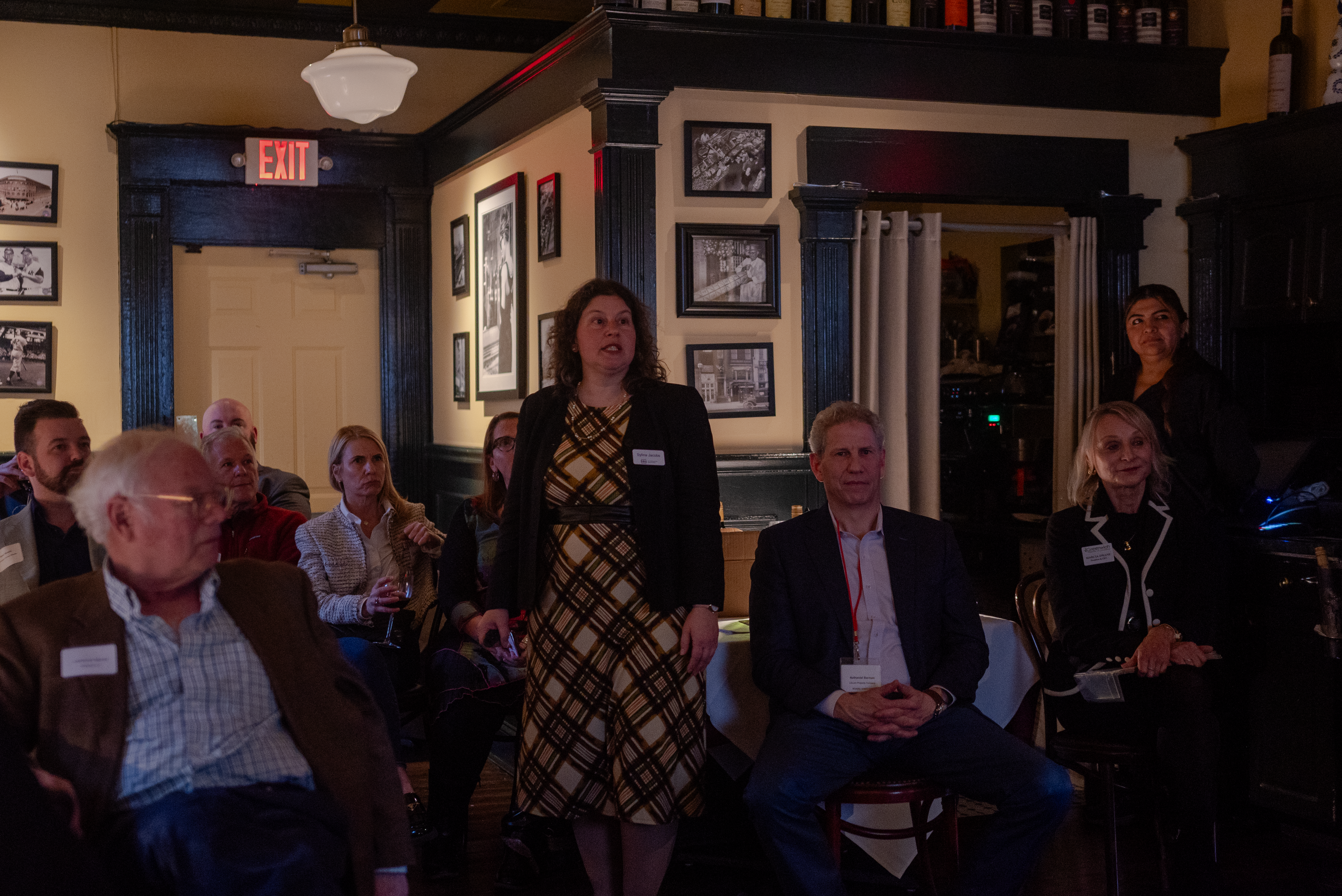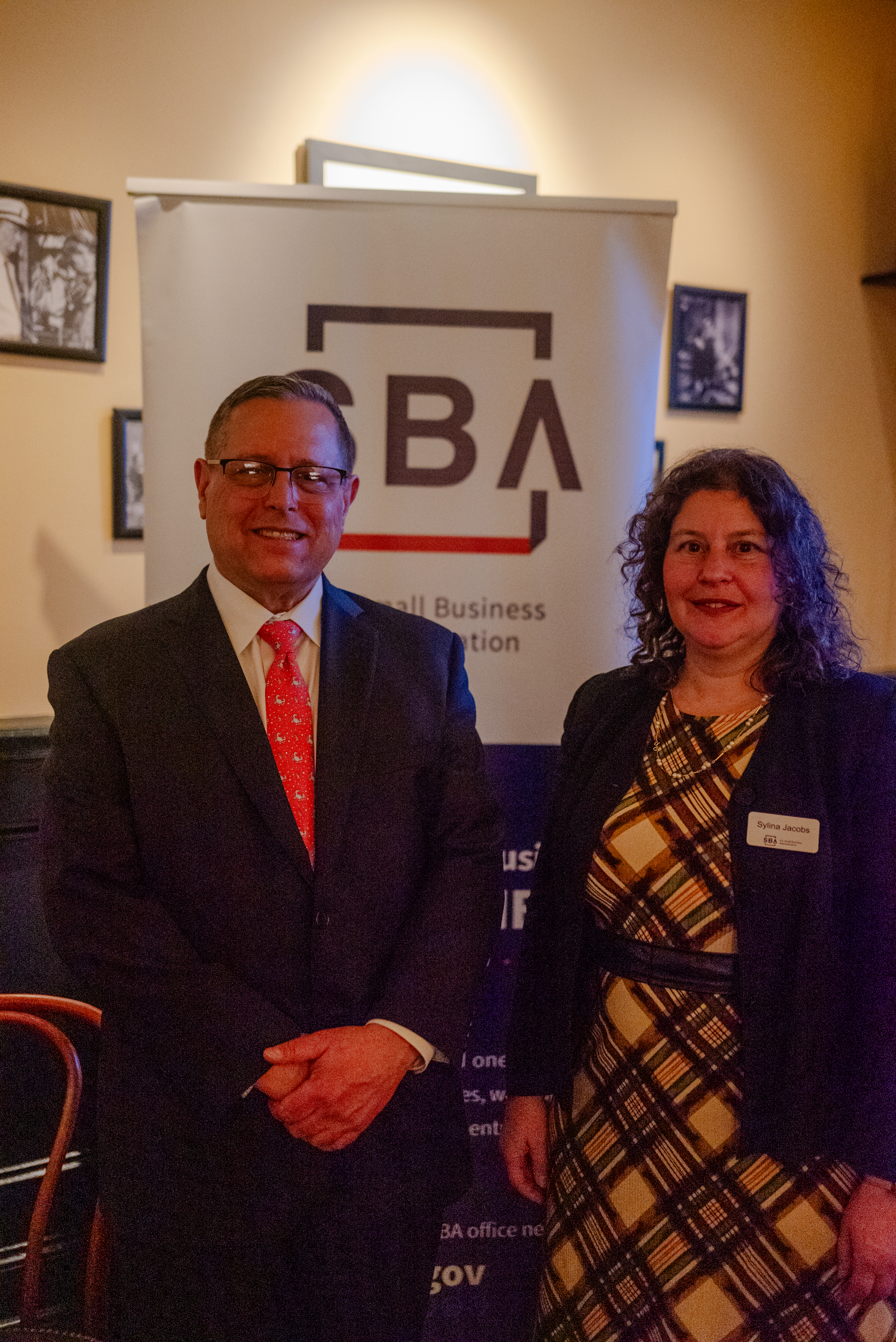On March 20 members of the Greenwich Chamber of Commerce gathered in the back room of Louie’s Italian Restaurant in Cos Cob. They were drawn by more than the food, fire lit ambiance, and chance to rub elbows with town First Selectman Fred Camillo who purportedly frequents the restaurant and prefers it as a site for his fireside chats.
While networking was on the agenda for the night, the primary goal of the event was to help business owners from across Greenwich understand how they can work with the Small Business Administration (SBA) to access vital capital and lines of credit so that they can continue growing their businesses.
Sylina Jacobs, an outreach and marketing specialist for the Bridgeport Branch Office of the SBA’s Connecticut District Office addressed the gathering, saying that the most important take away from her presentation would be the words “Capital, Contracting, and Counseling,” the “three Cs.”
“The United States Small Business Administration does government guaranteed lending,” Jacobs explained, noting that since the Small Business Act of 1953 created the Administration its offerings had expanded tremendously.

“We provide a lot of support. You can say it’s technically free to you,” she continued with a laugh, “because you pay for it in your taxes. So, you should try to take advantage of it.”
Jacobs stressed that the “Contracting” aspect of the SBA’s work can be of immense value to small businesses, since it plays a role in seeking out contractors for federal government.
“The United States government is the largest procurer of goods and services in the world,” Jacobs said.
“We also do a lot of outreach to women, minorities, and the armed forces, and we’ve got a part of the SBA that deals with natural disasters. So, it’s a pretty comprehensive agency,” Jacobs said of the “Counseling” component. She noted that despite the broad responsibilities the organization is small by the standards of the US government. The SBA only has six people assigned to Connecticut, including her, necessitating resource partners.
In 2023 the SBA only directly approved 894 loans for all 360 million small businesses in the country according to Jacobs. Those were primarily disaster related loans.
“A lot of people in small businesses think that they’re going to the SBA to get a loan and that isn’t true. Unless it is a disaster loan,” she said.
Instead, the SBA provides access to lending partners. Jacobs said that the resulting relationship is between a small business and a lender, who is responsible for underwriting and servicing the loan.
“The SBA provides what could be understood as an insurance policy. It’s the government guarantee. And it reaches anywhere from about 50 percent to 90 percent depending on the type of deal that the lender is trying to do.”
Jacobs described the 7a Program as the SBA’s signature loan, which can be used for most purposes in operating a company, from providing working capital to starting a business or refinancing.
The 504 loan on the other hand is used to provide access to commercial real estate loans and fixed assets. Jacobs clarified that “if you can put it in your truck, it is not a fixed asset. It has to be bolted to the ground; it’s got to be on a pad.”
The value of working with the SBA for these loans is that they make the loans far more attractive to lenders.
“Even with the best of underwriting there’s a lot of risks associated with lending to a small business,” Jacobs said. “That’s where the government guarantee comes in, it mitigates the risk. It also gives other benefits.”
Longer maturity and lower equity are often baked into SBA loans. Jacobs allowed that the interest rates tend to be higher, but still better than that offered by many credit cards, particularly when the equity required from the owner is typically around 10 percent instead of 25 to 35 percent for typical commercial loans.
Jacobs encouraged the audience to contact her or the SBA for more information about all three of the Cs, noting that they will also help businesses find other organizations that might offer grants or support beyond what the SBA can offer directly.
SVP & Director of Government Lending for Greenwich Bank & Trust David Moore spoke after Jacobs, explaining how a financial institution approaches loans with the SBA government guarantee.

Moore thanked the SBA for playing a part in keeping many of the bank’s customers in business throughout the Covid pandemic and praised the state’s SBA representatives for being an invaluable resource.
“The guarantee is an enhancement so that the bank can make loans that it wouldn’t typically consider,” Moore said. He noted that restaurants, particularly upon launch, often lack assets that can serve as collateral unless they own the building they operate in, which is not typically the case. “So, all the assets, the stoves, ovens, they’re usually fully depreciated. They don’t really have that value we can grab as collateral.”
Thanks to the SBA covering a significant amount of the risk, Moore explained, he can look harder at things besides the current assets of a client. He can consider whether a black mark in their credit history was the result of extenuating circumstances that don’t reflect their usual standard instead of rejecting an applicant out of hand. Or a business that just started might have everything it needs to make good on a loan and grow beyond it, but a short credit history.
“That brings me to my favorite story,” Moore said, recounting the owner of a single auto repair franchise. “He only owned it for about a year, and he went and got rejected by all the banks he went to. They said, ‘no you haven’t been in business for two years, we’re not even going to consider your loan.”
“Being from a community bank I took the time, and I asked some questions and got his resume. It turned out that before he had this franchise, he worked for a company that owned like 90 of these stores. He was their troubleshooter that would go turn around other stores that weren’t performing.”
Thanks to the SBA, Moore said, he was able to provide the man with a loan and he went from sleeping on his brother’s coach to planning to open his eighteenth location later this year, with a projected revenue of $20 million.
Moore stressed the value of the SBA in making it possible to provide loans that can be transformational for communities and companies both, and provided details about how it impacts his approach.
Attendees were encouraged to visit https://www.sba.gov/district/connecticut and https://ccbankonline.com/ to learn more.



















